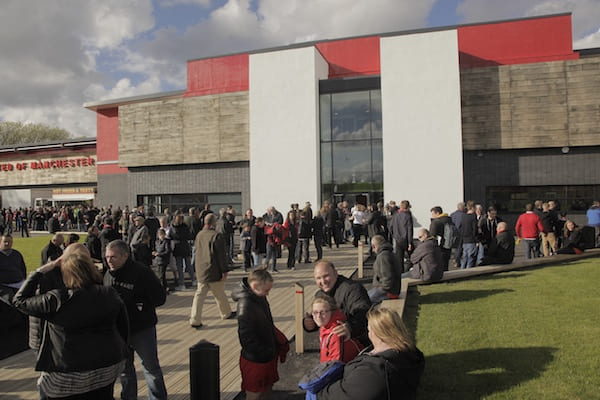Can social enterprise clean up British football?
In UK football private ownership prevails, but does the future of the beautiful game lie in fan ownership and control? Oliver Holtaway (MA Critical and Creative Analysis, 2013), secretary of Bath City FC Supporters Society, thinks so.
Originally posted on Pioneers Post. Pioneers Post delivers the news and sets the agenda for the new wave of responsible business leaders and social entrepreneurs.
British football has a serious problem with debt addiction. At all levels of the game, it’s depressingly common to see private investors chase short-term success with borrowed money, only to pull out when things (invariably) don’t go to plan and leave the club saddled with debt.
No surprise, then, that many football supporter groups across the UK are borrowing ideas from the co-operative movement and the social enterprise sector in order to create a more sustainable model for British football.
In recent years, several such groups have successfully taken their local clubs into community ownership, often by converting them from private limited companies into community interest companies (CICs) or community benefit societies (CBSs).
The change in company form has triggered a change in mindset: reimagining football clubs as social enterprises. It has also opened up new funding possibilities. An opportunity is now emerging for the social enterprise and investment sector to embrace and facilitate the community ownership movement in football.
Developing a culture of democracy
Fan ownership and control is the norm in many European countries. In Germany, for example, the “50+1” rule ensures that democratic members’ associations must own a controlling stake in every football club, giving fans greater influence. Spain’s footballing giants FC Barcelona and Real Madrid, meanwhile, are member-owned.
In the UK, private ownership prevails. That said, British football has been quietly developing its own democratic traditions over the past 25 years. In his book Punk Football, Jim Keoghan traces the rise of “supporters’ trusts”: democratic, not-for-profit membership organisations that seek to achieve ownership and control of football clubs on behalf of supporters and the local community.
Since 1992, over 100 supporters’ trusts have formed in the UK. Several trusts, including those at Wrexham AFC, Lewes FC and Exeter City FC, have successfully achieved majority control of their clubs.

Supporters’ trusts & community-owned clubs: an engine for social investment in football?
Social investors could potentially play a greater role in helping supporters’ trusts to achieve community takeovers, as well as helping community-owned clubs fund capital investments that promote financial sustainability and social impact.
Supporters’ trusts and community-owned clubs also typically seek to raise funds at a larger scale than many other social enterprises, which may make them more attractive to social investors.
Supporters’ trusts are usually co-operatives or community benefit societies. As such, they are eligible to seek a variety of types of social finance, including “community shares” (aka withdrawable share capital), social lending and blended finance – often qualifying for investor tax relief in the process.
Such funding can be used as part of community takeover bids. Last June, for instance, the Bath City FC Supporters Society launched a £750,000 community share offer with the aim of converting the club from a private limited company to a community benefit society (CBS). The community share prospectus qualified for Enterprise Investment Scheme (EIS) relief, while monies lent to the supporters’ trust to support the project received pre-approval for Social Investment Tax Relief (SITR).
Once community ownership is achieved, clubs will often seek capital investments to put themselves on a firmer footing. Here, blended finance is common.
In 2014, Lewes FC raised £650,000 to build an all-weather pitch next to its stadium, including £220,000 through an EIS-compliant community share offer. FC United of Manchester, meanwhile, raised £6.5m in 2015 to build a new stadium in Moston. This included £2m of community shares, almost £2m in grants, £845,000 in loans (including a loan from Manchester City Council) and over £450,000 in donations.
Financing social enterprise football: challenges
Of course, the usual challenges exist in terms of drafting a viable business plan and defining, measuring and communicating social impact to potential investors.
Community-owned football clubs create social value in ways that fans understand intuitively, but may be difficult for social investors to capture and score, such as the intrinsic value of securing the club’s continued existence as part of the local social fabric and the community capacity-building aspect of democratic self-governance.
Clubs must also recognise that grants and social lending come with strings attached. In extreme cases, fans have criticised community-owned clubs for over-reliance on external grant funding.
Nevertheless, there is clearly an opportunity for the social enterprise and investment sector to help British football transition to a more sustainable future. In particular, the sector could develop tools and services that allow supporters’ trusts to intervene earlier and launch community ownership bids from a position of strength, rather than waiting for a debt crisis to hit. New techniques for measuring the positive social impact of democratic ownership beyond traditional “football in the community” charitable schemes could also pave the way for further investment.
Find out more about the community ownership bid at Bath City FC.